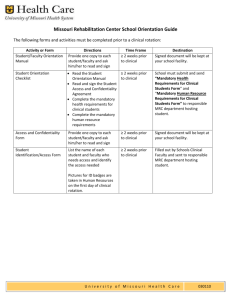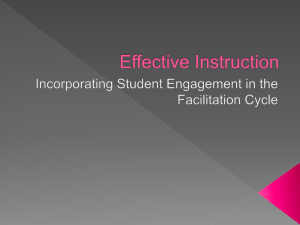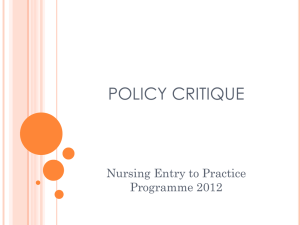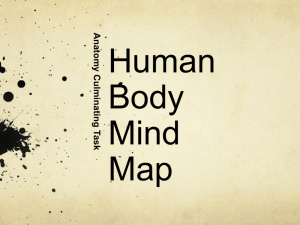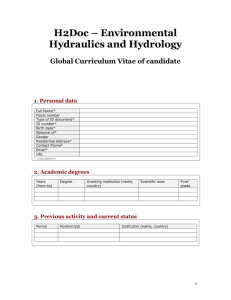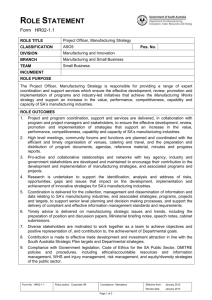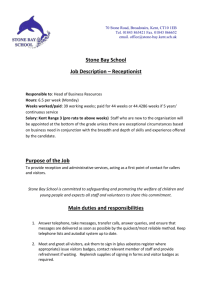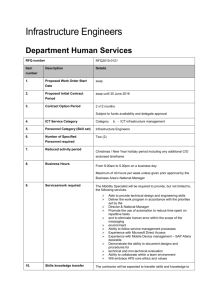Events Management (inc top up) BSc (Honours) FT
advertisement
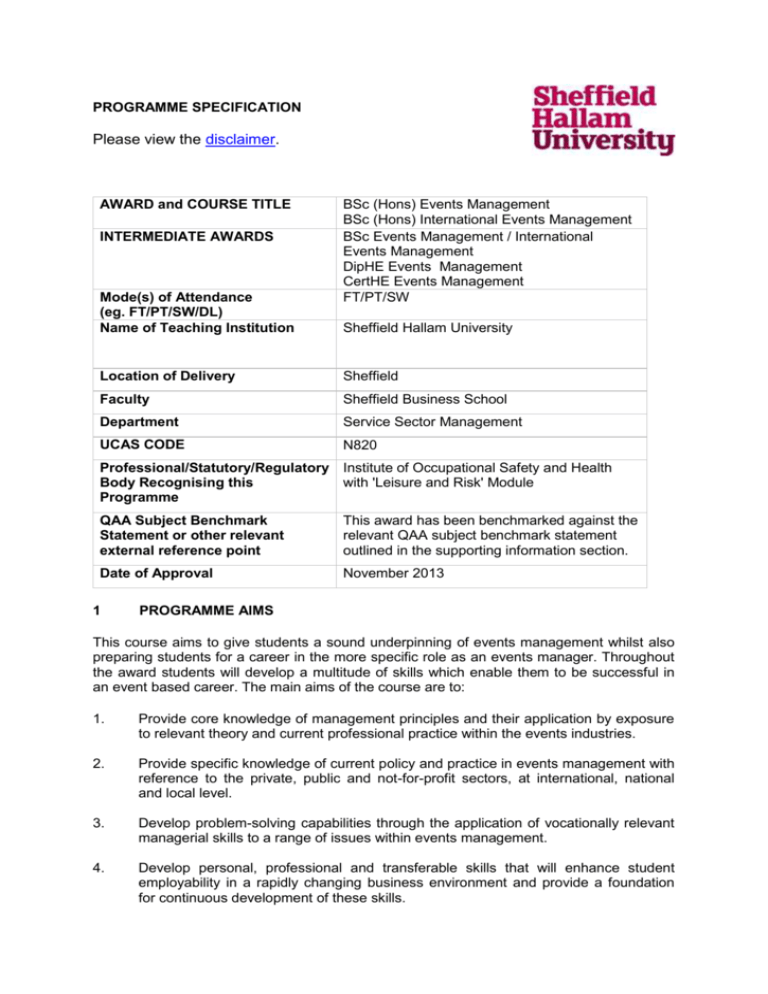
PROGRAMME SPECIFICATION Please view the disclaimer. AWARD and COURSE TITLE INTERMEDIATE AWARDS Mode(s) of Attendance (eg. FT/PT/SW/DL) Name of Teaching Institution BSc (Hons) Events Management BSc (Hons) International Events Management BSc Events Management / International Events Management DipHE Events Management CertHE Events Management FT/PT/SW Sheffield Hallam University Location of Delivery Sheffield Faculty Sheffield Business School Department Service Sector Management UCAS CODE N820 Professional/Statutory/Regulatory Institute of Occupational Safety and Health Body Recognising this with 'Leisure and Risk' Module Programme QAA Subject Benchmark Statement or other relevant external reference point This award has been benchmarked against the relevant QAA subject benchmark statement outlined in the supporting information section. Date of Approval November 2013 1 PROGRAMME AIMS This course aims to give students a sound underpinning of events management whilst also preparing students for a career in the more specific role as an events manager. Throughout the award students will develop a multitude of skills which enable them to be successful in an event based career. The main aims of the course are to: 1. Provide core knowledge of management principles and their application by exposure to relevant theory and current professional practice within the events industries. 2. Provide specific knowledge of current policy and practice in events management with reference to the private, public and not-for-profit sectors, at international, national and local level. 3. Develop problem-solving capabilities through the application of vocationally relevant managerial skills to a range of issues within events management. 4. Develop personal, professional and transferable skills that will enhance student employability in a rapidly changing business environment and provide a foundation for continuous development of these skills. 5. Develop self-confidence, motivation and communication skills in order to achieve educational goals and to succeed in the workplace. 6. Ensure that students become reflective practitioners with the capability of personal evaluation and lifelong learning. 7. Meet the requirements of the appropriate subject benchmark statement/professional body. 8. Apply and interpret theory and business practice in the work place though engagement with relevant work experience (SWE students only). 2 PROGRAMME LEARNING OUTCOMES 2.1 Knowledge and understanding covered within the Programme. By the end of the programme students will be able to 1. Evaluate and apply the theories, concepts, principles and practice from the generic management areas of operations, finance, human resources, economics and marketing to the events industries; 2. Understand and evaluate the changing UK and International business environment in which the events operate; 3. Use problem solving and research skills in order to design, execute and evaluate the effectiveness of management tools, and their application to event organisations; 4. Identify and implement strategic management and planning skills to analyse, understand and address the needs of event businesses; 5. Work with and critically evaluate the effectiveness of both a multi-disciplinary and inter-disciplinary approach to the study of events management; 2.2 Intellectual/Subject/Professional/Key skills covered within the Programme: by the end of the programme students will be able to 1. Analyse, prioritise and critically evaluate information, concepts and processes; 2. Present a persuasive argument that displays independence of thought and action and challenges existing assumptions from a number of informed perspectives; 3. Utilise appropriate information in order to design and justify innovative solutions to complex problems; 4. Exercise professional behaviour and ethical judgement in decision making and actions; 5. Understand the complexity and diversity of the events product, its customers and markets, structure and organisation; 6. Use planning and strategic decision making to deliver appropriate and sustainable managerial and entrepreneurial approaches to events; 7. Analyse, prioritise and critically evaluate information using appropriate numerical and CIT skills; Develop as a reflective, independent practitioner to promote personal development and employability and lifelong learning; 8. 9. Continue to develop effective communication, team leadership, negotiation and personal organisational skills. 3 LEARNING, TEACHING AND ASSESSMENT 3.1 The approach to Learning and Teaching within the Programme The aims and learning outcomes of the programme as a whole are achieved, in the main, by the learning, teaching and assessment associated with individual modules. Each module has a carefully constructed curriculum and method of delivery, which are provided to students, designed to support the achievement of module outcomes, and in turn contribute to programme outcomes. Teaching within the programme takes place both in large groups (e.g. lectures) and small groups (e.g. seminars, workshops and laboratory sessions). Tutors, using their subject expertise, introduce and explain topics, guide students in the use of materials, clarify and respond to student questions queries and comments. Teaching adopts activity-based and student-centred approaches to the facilitation of student learning. Learning takes place both within formal teaching sessions, and during guided and independent study undertaken by students, which includes collaborative group work. To support guided and independent study, students are provided with tasks, exercises, resources, and references to additional useful learning materials, to access, utilise and respond to as part of their study programme. All modules are supported through the university’s virtual learning environment (Blackboard), which acts as both a repository of module information, a communication tool between tutors and students, and a medium through which active learning takes place via activities and learning packages devised by tutors. Learning, teaching and assessment encourage students to develop key skills (e.g. problem solving, numeracy, IT skills) activities as well as a deep and critical knowledge of the subject matter of the programme, and are also designed to foster those employability attributes (e.g. reflection on learning, personal development planning, interpersonal communication skills) identified as important in modern organisations. Students produce a personal development portfolio, which acts as a mechanism for driving and reflecting upon personal development, as a key part of learning at all levels, that draws upon the academic, social and life experiences of students. As outlined in the documentation this programme takes an innovative and structured approach to properly embed the core pedagogic principles. Below is a clear articulation of how those principles are embedded into the programme Encouraging a deep approach to learning students will be asked to take an evidence based approach to their studies and critically evaluate key theories, industry practices and approaches. Active or experiential learning will occur through the use of group case studies in modules such as Operations Management, via a range of guest speakers and business games which are held throughout the entirety of their award. Both business and international contexts are evident in the delivery of the majority of the modules including Contemporary Business Environment at Level 4 and Contemporary Thinking in Marketing at Level 5. 3.2 Critical thinking and problem solving abilities, creativity and innovation will be developed and demonstrated by students, through a variety of learning experiences, as they progress through their studies. Study skills will be built up throughout the levels with the higher level critical thinking being examined at Level 6 in modules such as Strategic Management for the Events Industry and Project. A reflective practitioner approach is undertaken in modules such as Developing your Managerial Skills and Human Resource Management where students must undertake a reflective piece of work. This is on both their learning experiences for a particular task, throughout their university life, on their placement or upon their skills development. Collaborative and team working is encouraged through modules such as Live Event Management and Event Business Simulation. There are both assessed and formative group work activities which get students working in teams and experiencing different group dynamics. Clarity in respect of intended learning outcomes and assessment criteria will be provided. All modules distribute a module guide which clearly outlines the module's learning outcomes and the criteria against which assessment will be marked. Where phase test and other such instruments are used mock tests and past tests will be made available for students to add clarity. Time will be allocated in each module for staff and students to work through each other’s expectations and understanding of the module's assessment tasks. A wide array of assessment types are used throughout the programme. These range from individual phase tests, short answer tests, case study based reports, individual and group presentations, exams and role plays. This is in addition to the wide range of formative tasks undertaken such as business games, live scenarios and case studies. The approach to Assessment and Feedback within the Programme Assessment within the programme has a number of purposes: to establish the standard of achievement of each student, to act as a guide and motivator to learning, and to provide a mechanism for feedback to students on how they are progressing in their learning. Students experience a variety of assessment approaches at each level of study (e.g. project, essay, presentation, time-constrained exercise, multiple choice test, exam reflective exercises and portfolio). Feedback on learning takes a variety of forms e.g. oral feedback on class activities, written feedback on work undertaken outside the classroom, written feedback and marks awarded to assignments and coursework. Feedback will be provided in a timely fashion, and assessment that contributes marks for the module will be based upon assessment criteria that are made clear to students before they commence the assessed task. 3.3 How Student Employability is supported within the Programme All modules make a significant contribution to the employability pathway by providing students with a real life context to the topics they cover and by requiring them to use such skills as independent research, team work and presentations. This is done by using case studies, real life examples and scenarios which form the backbone of the employability policy by engaging you in the study and evaluation of industry sectors and at the same time developing key graduate skills such as literacy, critical thinking, personal organisation, and time management. Provision is made for students to integrate technical knowledge and skills from other mandatory vocational modules and so develop a more rounded understanding of the chosen industry sector. There are specific modules to support this development such as Developing your Managerial Skills, Events Industry Experience and Human Resource Management. Developing your Managerial Skills underpins the employability pathway throughout the programme with a focus on key employability skills such as team work, problems solving, developing your CV, communicating your skills to others and presenting yourself in a professional setting. The module is designed to be fast paced, interactive and to involve real contemporary issues faced by businesses in the sector. By including material contributed from businesses, students will gain knowledge and commercial awareness of the sector environment. Those students returning from placement will also be able to reflect upon their placement and make future career plans via the Career Management and Professional Development module. During year three, we help and encourage students to complete an optional one year paid work placement. This enables students to apply and develop their knowledge and skills in a real business environment. As students' progress through the levels their skills development will support a deeper approach to learning and encourage motivation as they are continually engaged in the study of their chosen professional sector. The professional focus of the award encourages an on-going engagement with subject knowledge and skills that are key to each student's employability in their chosen professional sector as well as the development of broader graduate key skills. 3.4 Main Type of Work-based or Work-related Learning featured in this Programme 4 All modules are focused on giving students key employability skills All students have the opportunity to apply for a placement year The university also supports short summer internships A range of employer and professional body guest talks are scheduled each year Assessments are often based on real companies / scenarios PROGRAMME DESIGN AND STRUCTURE The leisure and events industries play a significant part in business and cultural life in the UK and overseas. Private, public and voluntary organisations are all involved in this very large area of activity. This course meets the increasing demand for graduates with management skills in planning and organising events and in managing leisure venues such as • sports centres • stadia • theatres • arts centres. Students will build their understanding of leisure and events theory, policy and practice alongside the study of business management. A key part of this work includes projects and business simulations. Using them students will experience the part venues play in the leisure industry and events such as sporting events • concerts • festivals • business conferences • weddings. We develop students understanding of what is involved in the planning and management of events and other leisure activities. Students take a valuable period of Events Industry Experience in year two, either in the UK or internationally. It reflects the vocational nature of the degree, increases student's industry knowledge and improves employability after students graduate. Students may also take a one year paid placement in their third year to gain a sandwich award. We recommend this as it gives an insight into the workings of a business or service organisation. It allows students to apply what they have learnt to real work, and employers value this experience. Also, it can sometimes lead to the offer of a permanent job after graduation. Those students not going on placement will undertake the module Event Business Simulation which aims to recreate some of the skills students would have developed on placement. The course is focused on the leisure and events industry, but the broader analytical and personal skills students develop will be applicable to many careers. We use a student-centred approach to teaching and learning. This includes active participation in seminars, workshops and practical projects in our modern facilities at City Campus. The course has strong links with industry. There are a number of visits to venues and facilities both within Sheffield and nationally. Furthermore, industry specialists provide expert knowledge through guest lecture appearances. Top Up Degrees The degree offers two Level 6 entry top up awards with the same title as the parent award. Both meet the learning outcomes for parent award. The first variant is targeted at students who are either native English speakers or who have achieved an IELTS of at least 6.5 with at least 6.00 in all elements. The second variant is targeted at students whose first language is not English and who have only met the minimum university entry requirements in English (i.e. IELTS 6.0 with 5.5 in all elements). Therefore the second variant includes a 20 credit module in English for Academic Purposes (EAP) and a 20 credit module in Professional Studies in place of the project. Mode of attendance - Full Time Course year 1 1 1 1 1 1 1 1 2 2 2 2 2 2 2 2 2 2 3 3 Module Title The Human Side of Organisations Introduction to Marketing Accounting Skills for Managers Contemporary Business Environment Developing your Managerial Skills Resources for the Events Sector Events Foundation Events Industry Sector Management Accounting Operations Management Human Resource Management Contemporary Thinking in Marketing Research for Industry Events Business and Venues Management Events Industry Experience Leisure and Risk Business Events Operations Charity Events and Fund Raising Strategic Management for the Events Industry Events Business Simulation Module Code Level Credit Points Mandatory, Elective, Option 44-4509-00S 4 10 Mandatory 19-4B04-00S 4 10 Mandatory 19-4B03-00S 4 10 Mandatory 44-4504-00S 4 10 Mandatory 44-4937-00L 4 20 Mandatory 44-4516-00S 4 20 Mandatory 19-4L02-00S 44-4935-00L 19-5B02-00S 19-5B04-01S 4 4 5 5 20 20 10 10 Mandatory Mandatory Mandatory Mandatory 19-5206-00S 5 10 Mandatory 44-5980-00S 5 10 Mandatory 44-5952-00L 5 20 Mandatory 19-5L01-00L 5 20 Mandatory 44-5977-00S 5 10 Mandatory 44-5973-00S 5 10 Mandatory 44-5972-00S 5 10 Mandatory 44-5096-00S 5 10 Mandatory 44-6879-00L 6 20 Mandatory 44-6958-00L 6 20 Mandatory 3 3 3 3 Events Policy and Planning Live Event Management Strategic Event Design Project 44-6919-00L 6 20 Mandatory 44-6128-00L 44-6127-00L 44-6918-00L 6 6 6 20 20 20 Mandatory Mandatory Mandatory Mode of attendance - Sandwich Course year 1 1 1 1 1 1 1 1 2 2 2 2 2 2 2 2 2 2 4 4 Module Title The Human Side of Organisations Introduction to Marketing Accounting Skills for Managers Contemporary Business Environment Developing your Managerial Skills Resources for the Events Sector Events Foundation Events Industry Sector Management Accounting Operations Management Human Resource Management Contemporary Thinking in Marketing Research for Industry Events Business and Venues Management Events Industry Experience Leisure and Risk Business Events Operations Charity Events and Fundraising Strategic Management for the Events Industry Career Management and Professional Module Code Level Credit Points Mandatory, Elective, Option 44-4509-00S 4 10 Mandatory 19-4B04-00S 4 10 Mandatory 19-4B03-00S 4 10 Mandatory 44-4504-00S 4 10 Mandatory 44-4937-00L 4 20 Mandatory 44-4516-00S 4 20 Mandatory 19-4L02-00S 44-4935-00L 19-5B02-00S 19-5B04-01S 4 4 5 5 20 20 10 10 Mandatory Mandatory Mandatory Mandatory 19-5206-00S 5 10 Mandatory 44-5980-00S 5 10 Mandatory 44-5952-00L 5 20 Mandatory 19-5L01-00L 5 20 Mandatory 44-5977-00S 5 10 Mandatory 44-5973-00S 5 10 Mandatory 44-5972-00S 5 10 Mandatory 44-5096-00S 5 10 Mandatory 44-6879-00L 6 20 Mandatory 44-6898-00S 6 20 Mandatory 4 Development Events Policy and Planning Live Event Management 4 4 Strategic Event Design Project 4 44-6919-00L 6 20 Mandatory 44-6128-00L 44-6127-00L 6 20 Mandatory 6 6 20 20 Mandatory Mandatory 44-6879-00L 6 20 Mandatory 44-6958-00L 6 20 Mandatory 44-6919-00L 6 20 Mandatory 44-6127-00L 6 20 Mandatory 44-6128-00L 6 20 Mandatory 44-6918-00L 6 20 Mandatory 44-6918-00L Mode of attendance - Full Time Top-Up Degree 3 3 3 3 3 3 Strategic Management for the Events Industry Events Business Simulation or EAP Events Policy and Planning Strategic Event Design Live Event Management Project Mode of attendance - Full Time Top-Up Degree (International) 3 3 3 3 3 3 5 Strategic Management 19-6B02-00L 6 6 20 20 Mandatory Mandatory 44-6919-00L 6 20 Mandatory 44-6127-00L 6 20 Mandatory 44-6958-00L 6 20 Mandatory 44-6888-00L 6 20 Mandatory EAP Events Policy and Planning Strategic Event Design Events Business Simulation Professional Studies PROGRESSION/CAREER ROUTES Possible progression or career routes after you have completed this programme include There is a growing demand for graduates to manage leisure facilities such as stadia, arenas, clubs and arts venues as well as organising events such as sporting events, festivals, business conferences, and weddings. Organisations that use event managers include • local authorities leisure centres • music venues • hotels and conference centres • charities. Students can also go onto postgraduate study and there are a number of relevant courses both within SHU and at other institutions, such as: MSc International Events and Conference Management; Events Management; Sports Events Management; Event Fundraising and Sponsorship, which would be suitable progression. Furthermore, the management core of the overall programme opens up opportunities for students to opt towards more generic management postgraduate studies. 6 ENTRY REQUIREMENTS AND ENTRY PROFILE 6.1 Academic Qualifications (including A Normally five GCSEs at grade C or above, / AS level grades and subjects, including English language and where applicable) mathematics, plus one of the following • 300 points including at least 160 points from two GCE/VCE A levels or BTEC National qualifications. AS levels may count towards these points. We accept general studies. Key Skills qualifications are not included. • Access – an Access to HE Diploma with at least 45 credits at level 3 and 15 credits at level 2. At least 15 Level 3 credits must be at merit grade or above, from a QAArecognised Access to HE course, or an equivalent Access to HE certificate If English is not your first language you will need an IELTS score of 6.0 or above, with a minimum score of 5.5 in each skill. The entry requirements to the international top up pathway will be a relevant HND or equivalent qualification plus an IELTS score of 6.0 with no element scoring less than 5.5 or equivalent. International students whose first language is not English, will be admitted to the standard top up pathway if they have an IELTS score of 6.5 with no element scoring less than 6.0 or equivalent. Level of English language capability If English is not your first language you need an IELTS score of 6.0 or above, with a minimum score of 5.5 in each skill. Any other specific, formally certified N/A qualifications Previous relevant work or workrelated experience Any specific articulation arrangements recognised for this programme Professional qualifications Any other specific entry requirements 6.2 N/A N/A N/A None Entry Profile A good standard of educational attainment, as indicated by the admissions criteria for the programme, plus a genuine enthusiasm and commitment to the subject area of the programme of study for which students are applying. In addition, students should possess a desire to develop the skills and competencies required to succeed in higher education, and subsequently in their chosen professional or vocational area. We expect students to demonstrate through their personal statement an interest in and awareness of leisure and events management or some level of practical experience. 6.3 Non-standard Entry Requirements We welcome applications from people of any age. There may be some flexibility in entry requirements provided they have other relevant learning or experience. This may be formally accredited learning (i.e. where students have certificates to indicate the learning that has taken place and associated achievement) which is not covered in the above admissions requirements, experiential learning (i.e. learning which has taken place in contexts such as paid work, voluntary work, self-employment, or through other aspects of life experience) or a combination of the two. We look for evidence of experiential learning through such things as job descriptions, references, reflective personal statements, and interviews with course leaders and admissions tutors. Having reviewed the evidence we will then make a judgement as to whether or not students will benefit from and are likely to complete the course successfully. 6.4 Use of Prior Credit With prior certified learning (APCL), applicants may gain exemption from certain elements of the course, subject to standard University approval procedures. For example, students wishing to transfer from another degree course, at Sheffield Hallam University, or elsewhere, may gain exemption from specific Level 4 modules, or may apply for direct entry to Level 5 or Level 6 of the course. In both these cases, equivalence would need to be established between the learning outcomes previously achieved and those of the modules or levels for which exemptions were sought. With prior experiential learning (APEL), University approval procedures will also apply, i.e. an applicant will have to evidence how the Learning Outcomes of the module(s) against which APEL is being sought have been met.
